Wilhelmsen House
Wilhemsen House, also known as the Elders Building, Elder Building, Barwil House and the Dalgety & Co. Building, is a heritage building located at 11 Cliff Street on the corner of Phillimore Street in the port city of Fremantle, Western Australia.[1] The building dates from the gold rush boom period in the late nineteenth and early twentieth centuries and is of historic significance.
| Wilhelmsen House | |
|---|---|
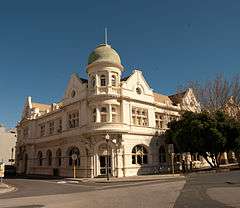 Wilhelmsen House 2012 | |
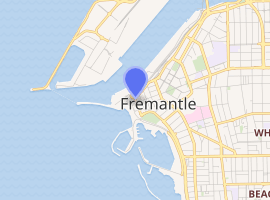
| |
| Alternative names | Elders Building |
| General information | |
| Architectural style | Federation Free Classical |
| Location | 32.05531°S 115.7421°E |
| Address | 7-11 Cliff Street, Fremantle |
| Town or city | Fremantle |
| Country | Australia |
| Current tenants | Mediterranean Shipping Company |
| Construction started | 1902 |
| Completed | June 1902 |
| Opened | 29 August 1902 |
| Renovated | 2014 |
| Cost | £30,000 |
| Client | Dalgety and Company |
| Design and construction | |
| Architect | Talbot Hobbs |
| Main contractor | W.H. Vincent |
| Type | State Registered Place |
| Designated | 23 June 2000 |
| Part of | West End, Fremantle (25225) |
| Reference no. | 854 |
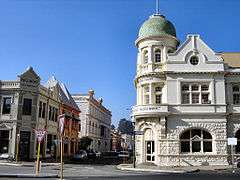
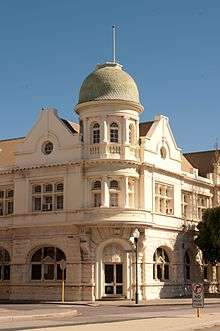
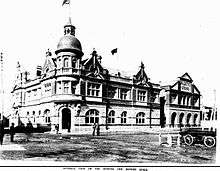
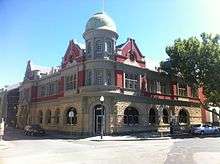
Description
The building is of Federation Free Classical style,[2] containing French Renaissance elements with a skyline of a 70 feet (21 m) tower,[3] gables. turrets and ornamental chimneys. The dominant feature on the skyline is the circular, domed, dragon's scale copper clad, turret. The general layout of the building is a U-shape with the open end of the U facing away from Cliff Street.[4] It rests on a wide foundation of concrete, above which is Melbourne bluestone. Between the base and the first floor is Cottesloe stone; above this is constructed from brick and cement dressings.[5] When constructed the building had 30,000 square feet (2,787 m2) of floor space. The floorboards were made of 2-inch-thick (5.1 cm) jarrah supported on 12-inch (30 cm) jarrah joists. The basement floor was made of cement. The warehouse had three floors and was 215 feet (66 m) long and 57 ft (17 m) wide with large sliding doors that opened directly onto the railway line side. Large flanking windows provided light for the interior. The warehouse was fitted with an electric wool press, three electric lifts and four travelling cranes to allow for swift dispatch of goods.[5]
Currently the building has a total floor area of 1,700 square metres (18,299 sq ft) on a site with an area of 1,484 square metres (15,974 sq ft).[2]
History
The building was built in 1902 for Dalgety and Company. At this time Dalgety were agents for companies including the Blue Funnel Line and W.A. Steam Navigation Company, whose ships sailed to Singapore via all northwest ports.[1] When Fremantle Harbour opened in 1897 all the merchants and the shipping industry were looking for office and warehouse space near the new port area.[6] The land at the site on Cliff Street was acquired by Dalgety and Co in February 1900, purchased from George Shenton.[4]
The building was designed by Talbot Hobbs, the well known architect who had also completed the Weld Club building and the Windsor Hotel in Perth and Victoria Hall in Fremantle.[7] It was built at a cost of £30,000, which was the largest contract price paid for a private building in the state at the time.[8] The main contractor for building was W.H. Vincent.[1][5]
The building was formally opened on 29 August 1902 in front of a large crowd of dignitaries including Hector Rason, Henry Briggs, James George Lee Steere and Edward Wittenoom.[9][10]
The Fremantle Harbour Trust occupied offices within the building in 1903 until their building was completed later the same year. Anchor Foods also had offices in the building in 1915 following a fire.[4]
In 1927 the building was sold to the agriculture suppliers Elder, Smith and Company and became commonly known as the Elders building.[8] It was sold for between £15,000 and £16,000 to Elders although Dalgety still occupied the building on a long lease. At this time there were 60 offices on two floors with some offices occupied by the Union Bank.[11]
The Naval Staff Office of the Royal Australian Navy occupied the building during World War II. They returned the building to the owners in September 1946 and moved back to HMAS Leeuwin base.[12]
In 1971 parts of the block were subdivided. Elders owned the building until 1982 when it was sold to Ale Nominee who have leased it for a variety of commercial endeavours.[4] The shipping line Wallenius Wilhelmsen took up the lease in the early 1990s and occupied the building for 25 years; it was popularly then known as the Wilhelmsen building. The building was later used by Challenger TAFE. Ale Nominees sold it to the current investment syndicate in 2002.[13]
In 2014 work commenced on a 12-metre-wide (39 ft) infill building between Wilhelmsen House and a neighbouring heritage building. The new structure will be glazed with a series of ribs that pick up on the cues of the existing heritage buildings on either side. The combined structure including a new renovation of the existing structure is designed to house over 150 workers.[14]
The state government awarded a A$100,000 grant for conservation works on the building in November 2016.[15]
In early 2016 the building was still undergoing a major restoration, with an addition being completed as part of the process.[8] The A$14.5 million renovation and 1,082-square-metre (11,647 sq ft) addition was completed in late 2016.[16]
See also
- Western Australian gold rushes
- List of heritage places in Fremantle
- List of buildings designed by Talbot Hobbs
| Wikimedia Commons has media related to Wilhelmsen House, Fremantle. |
References
- "Wilhelmsen House". State Heritage Office. 30 March 2016. Retrieved 17 December 2016.
- Jonathon Chancellor (17 May 2012). "Fremantle's 1902 Elder Building listed with $5 million hopes". Property Observer. Retrieved 19 December 2016.
- "The building trade at Fremantle". The Daily News. XX (8, 348). Western Australia. 21 May 1902. p. 3. Retrieved 19 December 2016 – via National Library of Australia.
- "Register of Heritage Places - Assessment Documentation Wilhelmsen House". Heritage Council of Western Australia. 23 June 2000. Retrieved 17 December 2016.
- "Dalgety's new buildings, Fremantle". Western Mail. XVII (858). Western Australia. 7 June 1902. p. 22. Retrieved 18 December 2016 – via National Library of Australia.
- "Port of Fremantle". The West Australian. 18 (5, 093). Western Australia. 4 July 1902. p. 3. Retrieved 19 December 2016 – via National Library of Australia.
- Heritage Council. "Victoria Hall". Heritage Council. Retrieved 16 December 2016.
- Emma Wynne (3 February 2016). "Fremantle's Wilhelmsen House a monument to shipping past, present and future". Australian Broadcasting Corporation. Retrieved 18 December 2016.
- "Messrs. Dalgety and Co. Limited". The West Australian. 18 (5, 142). Western Australia. 30 August 1902. p. 2. Retrieved 19 December 2016 – via National Library of Australia.
- "Messrs. Dalgety and Co. Ltd". Western Mail. XVII (871). Western Australia. 6 September 1902. p. 8. Retrieved 19 December 2016 – via National Library of Australia.
- "Fremantle Property". The West Australian. XLIII (7, 725). Western Australia. 5 March 1927. p. 8. Retrieved 19 December 2016 – via National Library of Australia.
- "Navy cuts down". The West Australian. 62 (18, 768). Western Australia. 7 September 1946. p. 6. Retrieved 19 December 2016 – via National Library of Australia.
- "Dalgety building". Fremantle Stuff. 15 June 2016. Retrieved 19 December 2016.
- "Cliff Street Infill". Slavin. 25 May 2015. Retrieved 18 December 2016.
- "Grant helps ensure a future for landmark red dingo". Media Statements. Government of Western Australia. 10 November 2015. Retrieved 18 November 2016.
- "Plenty of heave-ho behind building new Fremantle offices for shipping line MSC". Commercial Real Estate. 19 September 2016. Retrieved 18 December 2016.